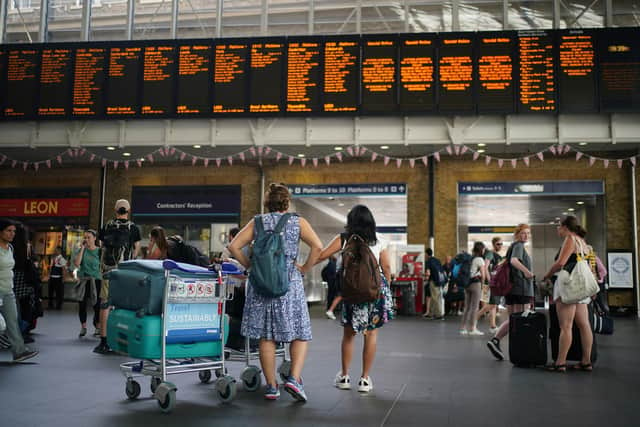Why it is time to call both rail companies and unions to heel - Jayne Dowle
Especially as this little adventure on a freezing, foggy December night to rescue my son was before the strikes crippling services this week even began. Northern Rail and TransPennine Express say no services will run tomorrow when members of the train drivers’ union Aslef walk out, amid a row over pay.
Drivers for LNER and EMR (East Midlands Railway) staged their own strikes last weekend, effectively cutting off Yorkshire from the capital by train at least. Dare anyone mention HS2?
Advertisement
Hide AdAdvertisement
Hide AdWe’re warned to also expect cancellations and delays over the first nine days of December because drivers will refuse to work overtime.


How cynical is this, at this time of year, when retail and hospitality need as much help as they can get? Especially as train drivers are hardly at the bottom of the wages pile. According to recruitment company Reed, an experienced train driver can already earn up to £70,000 a year in London, with £40,104 to £57,546 being the average salary for those employed by Northern Rail, for example.
The Rail Delivery Group, which represents operators, said the industrial action is “unnecessary and avoidable” as drivers have already received a fair offer that would take their base salaries for a four-day week from £60,000 to nearly £65,000.
Trade body UKHospitality warns the industrial action will “devastate trading during one of the busiest weeks of the year” and cost UK businesses up to £800m, as a total of 16 train operating companies take industrial action this month.
Advertisement
Hide AdAdvertisement
Hide AdBut it’s not just the strikes causing chaos and despair. Freezing winter conditions are nothing new, but across a rail system creaking at the seams snow and ice can’t always be dealt with effectively.
Last week, my 21-year-old son, Jack, had been in London for a few days visiting his girlfriend. The trouble started at around 6pm on Friday evening. He phoned from Kings Cross station to say that his train, to Retford, where he would change for Sheffield and then take a connection to Barnsley to join me and his sister at an 18th birthday party in town, was delayed.
By how long it was delayed he couldn’t find out, because no-one at the station could tell him, or inform any of the hundreds of other passengers milling about.
Kings Cross, you may recall, was actually closed in October this year because it became too overcrowded when flooding from Storm Babet caused chaos.
Advertisement
Hide AdAdvertisement
Hide AdThe only explanation Jack could get from station staff was that “damage to overhead cables near Retford is causing hold-ups”. A friend on Facebook posted she was also stuck, at an overflowing Paddington station, because of the same problem.
Jack was supposed to get to Sheffield for around 9pm. He finally arrived in South Yorkshire, not at Sheffield, but Doncaster, at 12.21am, exhausted, stressed and still confused as to why the service he was supposed to be travelling on had apparently disappeared into the night. He was not alone. The concourse at Doncaster was thronged with travellers, many of whom were presumably equally confused. The taxi queue snaked in front of the station and cars picking up weary people jostled for position. It was bedlam.
“Where is the duty of care?”, I wondered as I left the 18th birthday party to drive through freezing fog to collect my son. If I’d been unable to get there, he would have been stranded all night. He was due at work on Saturday morning at 8am. As a carer for adults with physical and mental needs, he doesn’t earn anything like £65,000 per annum.
My friend who came with me to Doncaster for moral support – and hasn’t been on a train for years - wondered why, when passengers are stranded in the middle of the night like this, train companies don’t immediately commission a fleet of buses to ferry them to their original destinations?
Advertisement
Hide AdAdvertisement
Hide AdI mentioned this to another friend. She said when services were cancelled between Sheffield and Leeds recently, one or two minibuses did turn up, but suspected these were sent by companies to pick up their marooned staff. How many other people missed a day’s work? My son almost did. And does anyone involved in the ongoing rail disputes really care?
Surely it is time for the elusive Mark Harper, Secretary of State for Transport, to step into the breach, admit that the train no longer takes the strain but causes it, and call both rail companies and unions to heel.
Comment Guidelines
National World encourages reader discussion on our stories. User feedback, insights and back-and-forth exchanges add a rich layer of context to reporting. Please review our Community Guidelines before commenting.
